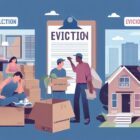Your Guide to Navigating Eviction Procedures in Subsidized Housing

Are you feeling lost and overwhelmed by the eviction process in subsidized housing? Look no further!
This guide is your ultimate resource to navigate eviction procedures with confidence. From understanding the reasons behind eviction to knowing your rights and protections, we’ve got you covered.
Stay informed and empowered as we take you through each step of the process. Don’t let eviction catch you off guard – arm yourself with the knowledge you need to protect your home.
Key Takeaways
- Understanding the eviction process in subsidized housing is crucial for tenants to protect their rights and prevent eviction.
- Common reasons for eviction in subsidized housing include non-payment of rent, violating occupancy rules, engaging in criminal activity or disturbing the peace, and damaging property beyond normal wear and tear.
- Tenants have rights and protections, including the right to receive written notice of eviction, a hearing before an impartial third party, legal representation during the hearing, and the right to request reasonable accommodation for disabilities.
- There are resources available for eviction assistance, such as legal aid organizations, tenant advocacy groups, housing counseling agencies, and government assistance programs.
Understanding Subsidized Housing Eviction
To understand the process of eviction in subsidized housing, it’s important for you to know what steps can be taken by the landlord. Eviction is a serious matter that can have significant consequences for both tenants and landlords. In subsidized housing, landlords must follow specific procedures when seeking to evict a tenant.
The first step is for the landlord to provide written notice to the tenant, stating the reason for the eviction and giving them a specific amount of time to address the issue. This notice must be served in person or sent by certified mail. If the tenant fails to remedy the issue within the specified time period, the landlord can then file an eviction lawsuit in court.
The court will then schedule a hearing, where both parties can present their case. If the judge rules in favor of the landlord, a writ of possession may be issued, allowing the landlord to regain control of the property.
Understanding these steps is crucial in navigating the eviction process in subsidized housing.
Now that you have a general understanding of the eviction process, it’s important to explore the common reasons for eviction in subsidized housing.
Common Reasons for Eviction
If you violate the terms of your lease agreement, the landlord may initiate eviction proceedings in subsidized housing. Understanding the common reasons for eviction can help you avoid potential issues and maintain a stable living situation.
One of the most common reasons for eviction is non-payment of rent. Failing to pay your rent on time and in full is a serious violation of your lease agreement and can lead to eviction.
Another common reason is violating the occupancy rules. Subsidized housing often has restrictions on the number of occupants allowed in a unit, and exceeding these limits can result in eviction.
Engaging in criminal activity or disturbing the peace is also grounds for eviction. This includes drug-related offenses, violence, or any behavior that poses a threat to the safety and well-being of other residents.
Additionally, if you damage the property beyond normal wear and tear, the landlord has the right to evict you.
Understanding these common reasons for eviction can help you avoid potential issues and ensure that you comply with the terms of your lease agreement. By addressing any concerns or issues promptly, you can work towards resolving them before they escalate to eviction proceedings.
Steps in the Eviction Process
Once eviction proceedings have been initiated, it’s important for you to understand the steps involved in the process. This knowledge will empower you to navigate the eviction process more effectively.
The first step is typically the landlord serving you with a notice of eviction. This notice will inform you of the reasons for eviction and give you a specific time period to respond or rectify the situation.
If you fail to resolve the issue within the given time frame, the landlord can then file a lawsuit against you in court. This leads to the next step, which is the court hearing.
During the hearing, both parties will have the opportunity to present their case and provide evidence. If the court rules in favor of the landlord, they’ll receive a judgment of possession. This means that the landlord now has the legal right to regain possession of the property.
However, the eviction process isn’t over yet. The next step is the execution of the judgment, which involves the landlord obtaining a writ of possession from the court. This writ authorizes law enforcement to remove you and your belongings from the property if you haven’t vacated voluntarily.
It’s important to note that the eviction process can vary depending on state and local laws, so it’s crucial to consult with an attorney or legal aid organization for specific guidance.
Your Rights and Protections
As you navigate the eviction process in subsidized housing, it’s important to be aware of your rights and the protections available to you. These rights and protections are designed to ensure that you’re treated fairly and have the opportunity to address any issues that may arise during the eviction process.
First and foremost, you have the right to receive written notice of the eviction. This notice should include the reason for the eviction, the date by which you must vacate the premises, and information on how to contest the eviction if you believe it’s unjust.
You also have the right to a hearing before an impartial third party. This allows you to present your case and provide evidence to support your position. It’s important to note that you have the right to legal representation during this hearing, so you may want to consider seeking assistance from a lawyer or legal aid organization.
Additionally, you have the right to request a reasonable accommodation if you have a disability that may be impacting your ability to comply with the terms of your lease. This could include modifications to your unit or changes to the rules and policies of the housing provider.
In conclusion, understanding your rights and protections is crucial as you navigate the eviction process in subsidized housing. These rights ensure that you have a fair chance to address any issues that may arise and protect you from unjust eviction.
Transitioning into the next section about ‘resources for eviction assistance’, it’s important to know where to turn for help during this challenging time.
Resources for Eviction Assistance
To access the necessary support during the eviction process in subsidized housing, utilize the available resources that can provide you with assistance. Here are four key resources that can help you navigate through this challenging time:
- Legal Aid Organizations: These organizations offer free or low-cost legal services to individuals facing eviction. They can provide you with legal advice, representation in court, and help you understand your rights and options.
- Tenant Advocacy Groups: These groups work to protect the rights of tenants and can provide valuable resources and support during the eviction process. They can offer guidance on negotiating with landlords, understanding your lease agreement, and connecting you with other services you may need.
- Housing Counseling Agencies: These agencies offer counseling and guidance on housing-related issues, including eviction. They can help you explore alternative housing options, negotiate with your landlord, and develop a plan to address your specific situation.
- Government Assistance Programs: Depending on your circumstances, you may be eligible for government assistance programs that can help with rent payments or provide temporary housing. Contact your local housing authority or social services agency to inquire about the availability of such programs in your area.
Frequently Asked Questions
Can I Be Evicted From Subsidized Housing if I Am Unable to Pay My Rent Due to Unexpected Financial Hardship?
If you are unable to pay rent due to unexpected financial hardship, you could face eviction from subsidized housing. However, it is important to understand the specific procedures and regulations that apply in your situation.
What Happens if I Am Evicted From Subsidized Housing? Will I Be Able to Find Another Subsidized Housing Unit?
If you are evicted from subsidized housing, you may have difficulty finding another subsidized unit due to high demand. It is important to explore alternative housing options and resources to ensure you have a place to live.
Can the Landlord Terminate My Lease and Evict Me if I Have a Disability and Require Accommodations?
Yes, the landlord can terminate your lease and evict you even if you have a disability and require accommodations. However, they must still follow the proper eviction procedures and consider reasonable accommodations.
Are There Any Alternatives to Eviction That I Can Explore if I Am Facing Eviction From Subsidized Housing?
If you are facing eviction from subsidized housing, there may be alternatives you can explore. These alternatives could include negotiating with your landlord, seeking mediation, or applying for emergency rental assistance.
If I Am Evicted From Subsidized Housing, Will It Affect My Eligibility for Other Government Assistance Programs?
If you’re evicted from subsidized housing, it may affect your eligibility for other government assistance programs. It’s important to understand the specific rules and regulations governing each program to determine the potential impact.



